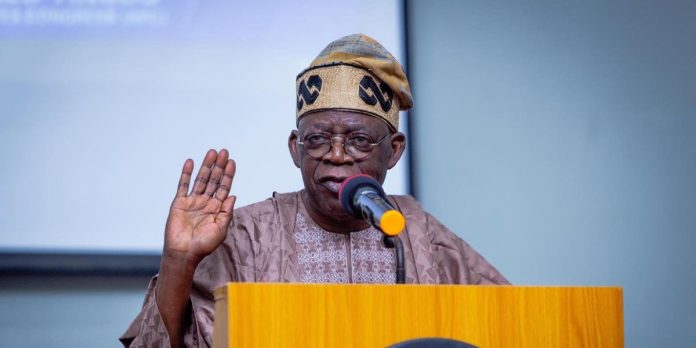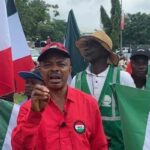FG asks Nigerians not to blame Tinubu for petrol price hike
The Labour Party and Peoples Democratic Party have reacted as the Federal Government urged Nigerians not to blame President Bola Ahmed Tinubu solely for the recent Premium Motor Spirit otherwise called petrol price hike.
On Wednesday, NNPC retail stations raised the price of petrol to N1,030 from N897/litre in Abuja, and in Lagos, it was hiked to N998/litre from N868/litre. Other locations witnessed similar price hikes, which triggered anger among Nigerians.
The price hike, the second in one month, represents about 14.8 per cent or N133 rise.
With the latest price adjustment, it means that in the less than 17 months of the current administration, the price of petrol has risen by over 430 per cent from May 29, when it took over the reins of power.
Last month, the national oil company raised the pump price of petrol to N897/litre from the official price of N617 per litre it hitherto sold in Abuja.
It came days after the NNPC said it was heavily constrained by the huge debt it owed international suppliers. The debt is estimated to be $6.8bn.
This development comes days after the NNPC decided to terminate its exclusive purchase agreement with Dangote Refinery, giving room for other players downstream to buy products directly from the Dangote Refinery.
Oil marketers said NNPC’s withdrawal as the sole off-taker of petrol from Dangote refinery meant the Federal Government had systematically stopped subsidy on petrol completely.
It also meant the product would be sold to marketers on a willing buyer, willing seller basis.
The price jumped to as high as N1,200/litre in some other stations in Abuja. For instance, customers bought petrol from one of the Eterna stations in the city centre at N1,200/litre. Mobil station at Arab junction sold to its customers at N990/litre while all NNPCL stations along with Berger didn’t display its pump price.
Minutes after the petrol price hike by NNPCL and other dealers, drivers and transporters have raised their fares.
A report from The PUNCH noted that the cost of a one-way trip from Lugbe to Wuse in Abuja has increased from N700 to N1,000.
In Borno State, transport costs also surged as fuel prices reached N1,250 per litre. It was learnt that many filling stations, including NNPC outlets, were closed, while those still operating set prices at N1,250 per litre. Commercial stations sold fuel for N1,100 per litre, contributing to an artificial scarcity in Katsina State.
In Ilorin, Kwara State, as of Wednesday evening, NNPC stations listed petrol at N1,045 per litre, while Orange Global sold it for N1,300, Rainoil for N1,210, and Total for N1,210.
In Edo, most marketers offered petrol at N1,250 per litre, while in Delta, prices ranged from N1,100 to N1,200, and in Benue, between N1,200 and N1,250.
In Abia, prices varied between N1,200 and N1,300, and in Yobe, NNPC sold fuel for N1,098, with other stations pricing it between N1,150 and N1,170. In Ondo, prices ranged from N970 to N1,000 in the morning but rose to N1,115 by evening.
NLC and others kick
The Nigeria Labour Congress (NLC) has condemned the nationwide petrol price hike, demanding an immediate reversal and accusing the government of focusing solely on price increases.
NLC President Joe Ajaero criticized NNPCL for acting like a monopoly and called for a comprehensive economic growth plan instead of sporadic policies that harm the population.
The Organised Private Sector also expressed concern, with the Director-General of the Manufacturers Association of Nigeria, Segun Ajayi-Kadir, highlighting that the hike will raise production costs and negatively impact disposable income, leading to reduced consumer spending and potential job losses.
Dr. Muda Yusuf, from the Centre for Promotion of Private Enterprise, described the timing of the price increase as poorly aligned with current economic conditions and suggested that the government should implement measures to ease economic challenges rather than exacerbate them. He recommended tax cuts on industrial materials and a fixed customs exchange rate to mitigate import costs.
Dr. Femi Egbesola, National President of the Association of Small Business Owners of Nigeria, criticized the lack of prior notice regarding the hike, warning that it could worsen inflation and severely impact businesses, logistics, and consumer purchasing power, potentially leading to job losses.
Opposition react
Meanwhile, opposition parties Peoples Democratic Party and the Labour Party unanimously condemned the hike in the price of petrol on Wednesday.
Speaking on the fuel price hike, the PDP Deputy National Youth Leader, Timothy Osadolor, said Nigerians were struggling because President Bola Tinubu announced the removal of fuel subsidy without fully grasping its significance.
“I think this is a true reflection of the insensitivity of President Tinubu’s government. This incessant increase in fuel prices is a result of his policy inconsistencies and the recklessness of his government in their words and actions.
“You will recall that only a few hours after President Tinubu was sworn in, without having the backing or the knowledge of the economic situation of the country that he had just begun to govern, he started making reckless comments about the most important lifeline of the country, which is subsidy, and the oil sector.
“He was speaking without understanding the mathematics and the arithmetic behind the energy sector in the country. That statement triggered a lot of negative reactions across the economic sector of the country.
“You will recall again that just a few days after that, the naira started depreciating against the dollar. He then instructed his tax minister, who is the governor of the CBN, whose only responsibility is to increase taxes and generate revenue. However, tax generation and tax collection are not the best or ideal ways to grow any economy worldwide.”
Osadolor expressed concern over the naira devaluation, noting that Nigeria’s status as an importing nation meant everything was linked to the dollar.
He added, “He made a bogus statement about the Port Harcourt and Kaduna refineries all coming online. Meanwhile, in this year’s annual budget, we saw billions of naira allocated to the Port Harcourt refinery and other refineries in this country.
“As we speak, not only have those funds been spent, but there is no value for that money, and there is nobody in jail or being prosecuted for the misappropriation and embezzlement of those billions of naira.
“President Tinubu has shown that within the confines of the villa, he does not hear the cries of the common man in Benin, the common woman in Warri, or the common Nigerian in Daura. He is insensitive to the plight of Nigerians because he is too comfortable.’’
The National Publicity Secretary of the Labour Party, Obiora Ifoh, told The PUNCH that they warned Nigerians against voting President Bola Tinubu into office.
He said, “This is what the Labour Party has been warning Nigerians about. We told them a long time before the election that this thing would happen, that the man they planned to bring in was a tax master who would stop at nothing to inflict pain on Nigerians.
“Remember that the NNPCL boss told us that the President is comparing Nigeria with neighbouring countries where fuel sells for over N2,000 per litre. They may be targeting that now that fuel is officially above N1,000 and in some places, it may go as high as N1,600. From the look of things, it is gradually approaching the N2,000 mark.’’
He added, “There is a whole lot of confusion in this government and the centre can no longer hold. That is why we keep saying that in as much as there is nothing anyone can do now, Nigerians should continue praying to witness 2027 for them to use their votes to do the needful.
‘’But the LP has a template to reverse some of these anomalies and obnoxious policies we are witnessing to get Nigeria working again. The longer we stay with this government, the more penury Nigerians will face.”
National Chairman, Social Democratic Party (SDP), Shehu Gabam, questioned the Federal Government on what they hoped to accomplish with the ongoing increases in petroleum pump prices.
He stated, “That is the level of deterioration the country is experiencing, along with hunger, poverty, and insecurity. The challenges Nigerians are facing are suffocating them.
“For me, I don’t know what the government aims to achieve with this. I don’t understand the government’s direction or why they are discussing palliative measures.
“On one hand, they are talking about palliative support, on the other, they are taking it away from the lives of Nigerians. It goes beyond what anyone can comprehend.’
“The danger is that if you push Nigerians beyond their limits, nobody can predict what will happen. The suffering, hunger, barbarism, insecurity and violence currently occurring have never happened under any administration in Nigeria’s history.”
We’re not responsible for price hikes – FG
Meanwhile, the Federal Government has said it is not responsible for the hike in the pump price of petrol.
Minister of Information and National Orientation, Mohammed Idris in an interview with Daily Trust said the government should not be held responsible for the latest hike in petrol price.
The minister explained that the NNPCL made the decision in response to prevailing circumstances in the energy industry, emphasising that it did not act on any instruction from the federal government, as the government can no longer fix prices of petroleum products, in line with the provisions of the Petroleum Industry Act (PIA).
He said with the subsidy regime ending since May 2023, the NNPCL had only been paying differential to keep the price within the range it had been, but the company said it could no longer absorb the losses.
“The differential you’re seeing is a result of different factors. One of them is the crisis in the Middle East. There’s volatility in the market. Therefore, the prices of petroleum products are going up, consistent with what is happening with other operators in the industry globally. Secondly, NNPC cannot continue to absorb these losses for Nigeria because as a limited liability company, it would be operating at a loss,” he said.
The minister urged Nigerians to continue to show understanding with the NNPCL and the government, assuring that in the long run the prices would ultimately come down.
He said the government would continue to invest the savings from removal of subsidy to improve other critical sectors like healthcare, education, infrastructure, and security.
He added that the initial investments of the government in CNG would also ameliorate the impact even as more operators invest.


